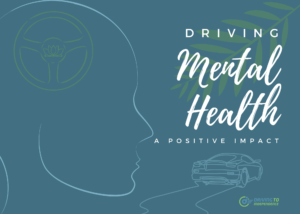
For individuals with disabilities, the ability to drive is more than just a means of transportation; it symbolizes freedom, autonomy, and a path to greater independence. Driving not only facilitates physical mobility but also plays a crucial role in enhancing mental well-being. This blog explores the significant impact that gaining the ability to drive can have on mental health and overall independence for individuals with disabilities.
The Connection Between Driving and Mental Health
Sense of Control and Empowerment
Driving provides individuals with a sense of control over their The ability to navigate their surroundings independently can significantly boost self-esteem and confidence. Research indicates that autonomy in mobility is closely linked to improved mental health outcomes, as individuals feel empowered to make choices about their daily activities and social engagements.
Reduction of Isolation
Transportation barriers often lead to social isolation, which can exacerbate feelings of loneliness and By gaining the ability to drive, individuals can connect with family, friends, and community activities, fostering social interactions that are essential for mental health. Studies show that maintaining social connections is vital for emotional well-being, especially for individuals facing physical limitations.
Building Resilience and Coping Skills
Gaining the ability to drive can help individuals with disabilities develop resilience and coping skills. The process of learning to drive and facing various challenges on the road encourages problem-solving and adaptability. As individuals navigate traffic, respond to unexpected situations, and manage stress while driving, they cultivate important life skills that translate to other areas of their lives. Research indicates that overcoming challenges can enhance an individual’s ability to cope with stress and setbacks, leading to improved mental health and emotional well-being.
Driving as a Form of Therapy
For some individuals, driving can serve as a therapeutic outlet. The act of driving allows for moments of solitude and reflection, providing a space to clear one’s mind and manage Many people find that spending time on the road can lead to increased mental clarity and emotional release. Studies have shown that engaging in activities that provide a sense of freedom and control can significantly reduce symptoms of anxiety and depression . This therapeutic aspect can be particularly important for individuals coping with the challenges of a disability.
Development of Daily Living Skills
Gaining the ability to drive often encourages individuals to develop other essential life skills, such as time management and planning. When individuals can drive, they take on the responsibility of organizing their schedules, managing appointments, and navigating logistics for daily This empowerment not only enhances their overall independence but also contributes to a sense of accomplishment and self-worth, which are crucial for mental health . Additionally, these skills translate into improved decision-making abilities, further bolstering one’s confidence and mental resilience.
Conclusion
The ability to drive is a significant milestone for individuals with disabilities, offering not only a mode of transportation but also a profound impact on mental health and independence. As we work towards creating inclusive environments that promote accessible driving, we must recognize and advocate for the benefits that mobility brings to the lives of those with disabilities.
At Driving to Independence, we are dedicated to providing the necessary training and support to help individuals gain the confidence and skills needed to navigate the roads. Together, we can drive toward a future where everyone has the opportunity to experience the freedom of mobility.
